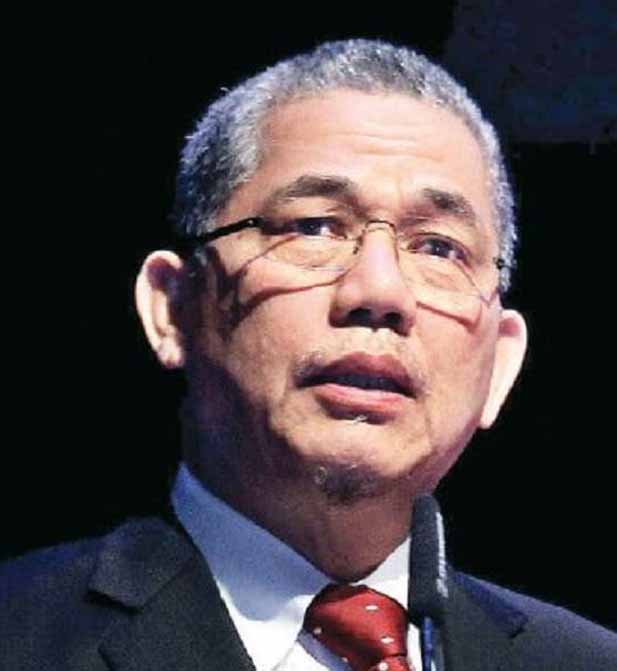
Fadillah briefed on the water supply problem at UMS today. – Bernama photo
KOTA KINABALU (July 14): Federal Energy Transition and Water Transformation Minister Dato’ Sri Fadillah Yusof has announced a RM1 million allocation to implement urgent measures addressing water supply issues at Universiti Malaysia Sabah (UMS), particularly affecting student hostels.
Fadillah, who is also the Deputy Prime Minister, said one of UMS’s most pressing challenges is the inconsistent water supply to student accommodations, where water often fails to reach the storage tanks during peak usage times.
Following a site visit to UMS today — after attending the Malaysia Agreement 1963 (MA63) Technical Committee meeting focused on Sabah at Menara Kinabalu — Fadillah said the ministry held discussions with the Sabah Water Department and UMS representatives.
“Based on the feedback, we are allocating RM1 million to implement several projects to ensure that water reaches the hostel storage tanks, especially during critical hours — three hours in the morning and three hours in the evening. Once completed, we hope this will significantly ease the water shortage problems in the student hostels,” he said.
Later, Fadillah visited the RM48 million Sungai Damai Basin 8 flood mitigation project in Kota Kinabalu, which began in September 2023. As of now, the project is 54% complete and is expected to be ready by July 2026, barring any delays. Once completed, it is projected to reduce flooding risks for around 17,500 residents in the area.
Under the 12th Malaysia Plan (5th Rolling Plan), RM153.3 million has also been allocated for 27 projects under the Irrigation and Drainage Department (JPS) across Sabah. These include 24 ongoing and three new projects covering flood mitigation, coastal erosion control, river mouth maintenance, riverbank stabilisation and mechanical and electrical works.
During his visit to the Kota Kinabalu 132/33kV Main Intake Substation (PMU), Fadillah said the project — valued at RM260.75 million — involves the upgrading of intake systems, new grid connections and the installation of an energy security monitoring system across areas including Tanjung Aru, Ranau, Batu Sapi and Labuan.
He noted that the seven major completed projects include:
PMU KKBU (Kota Kinabalu): Supplying both 132kV and 33kV electricity, this project benefits 11,452 consumers.
132kV Grid Extension from Labuan to Sipitang (Phase 1):
RM34.92 million project involving a 7km 275kV transmission tower line from PMU Menggalung to the Sindumin border in Sabah, connecting to Lawas, Sarawak. Completed on 2 September 2024.
33/11kV Main Distribution Substation (PPU) in Ranau:
RM31.3 million project that began operations on 11 January 2024 and was completed on 15 March 2024.
PPU Batu Sapi:
RM34.02 million project addressing issues with an ageing power system. Operations began on 13 December 2024.
Protection Online Monitoring Project:
RM42 million upgrade including the installation of a 15km undersea fibre optic cable from Kampung Lambidan (Menumbok) to Tanjung Aru (Labuan), completed on 5 February 2024.
132/33/11kV PMU at UMS:
Valued at RM50.01 million, this project began operations on 12 August 2024 and supports increased electricity capacity in the UMS area.
11kV System Reinforcement in Labuan:
RM6.3 million project completed on 9 November 2024 to improve system resilience and support new developments.
“These are the projects we inspected on the ground today,” Fadillah said.
He also announced a visit to the Kota Kinabalu International Airport (KKIA), where Malaysia Airports Berhad is implementing a rooftop solar panel initiative under the Self-Consumption (SELCO) scheme, allowing energy generated to be used internally. The project, approved in 2022 and regulated under the Energy Commission of Sabah (ECoS), will provide up to 4MW of rooftop solar capacity.
In addition, Fadillah said his team will be visiting the Putatan Sewerage Scheme project, valued at RM134.4 million. The project began on 21 December 2020 and had reached 69.85% progress as of June 2025. It is expected to be completed by 3 March 2026.
The sewerage project will enhance wastewater treatment infrastructure in the Putatan district. Key components include the construction of a treatment plant with a 50,000 PE capacity, a 9.9km sewer network, rationalisation of three small plants in the area, and five new sewerage pipelines totaling 60 metres.
“We are here to assess the progress and identify ways to ensure this critical infrastructure project is completed on schedule,” Fadillah added.












